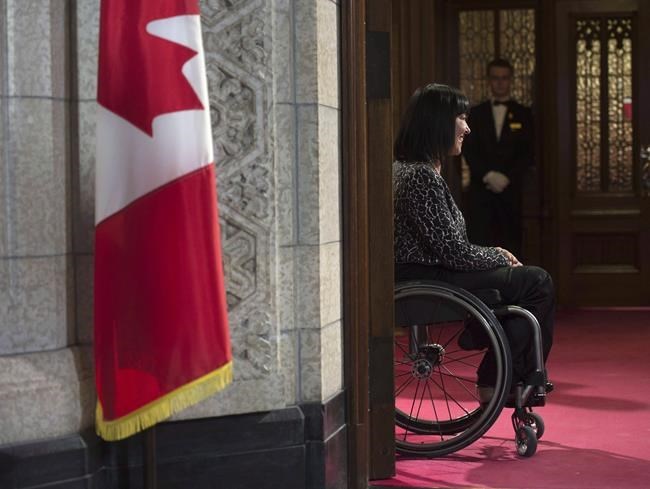OTTAWA — Senators have agreed to put a bill to expand access to medical assistance in dying to a final vote by Feb. 17, but they've signalled their intention to propose substantial amendments.Â
The agreed date for the vote will leave just over a week for the House of Commons to deal with any amendments approved by the Senate before a thrice-extended, court-imposed deadline of Feb. 26.
It's a tight timetable that could yet make it impossible to meet the court deadline.
Senators, who began final debate Monday, will begin dealing with the amendments to Bill C-7 on Tuesday.
An amended version of the bill would have to go back to the House of Commons for MPs to decide whether to accept or reject the amendments before shipping it back to the Senate, where senators would have to decide whether to approve the bill even if some or all of their amendments were rejected.
In theory, the bill could bounce repeatedly back and forth between chambers.
The bill is intended to bring the law into compliance with a 2019 Quebec Superior Court ruling that struck down a provision allowing assisted dying only for those whose natural death is "reasonably foreseeable."
It scraps that provision but retains the foreseeable death concept to set up two sets of rules for eligibility: more relaxed rules for those who are near death and more stringent rules for those who are not.
It would also expressly prohibit assisted dying for individuals who are suffering solely from mental illnesses.
Sen. Marc Gold, the government's representative in the Senate, acknowledged that some senators think the bill goes too far, while others think it doesn't go far enough. But he said, to his mind, that divergence of opinion demonstrates that the bill has struck the right balance.
 "The bottom line is that it is a reasonable, prudent proposal that achieves a complex balancing of rights ... Bill C-7 is neither too hot, nor too cold, but just the right temperature," Gold said during Monday's debate.
Gold further suggested that unelected senators should be cautious about tinkering with the bill, noting it was supported by two-thirds of elected MPs from all parties in the House of Commons, giving it "a strong democratic stamp of approval."
But Sen. Pierre Dalphond, a former judge who sits in the Progressive Senate Group, argued that the exclusion of those suffering solely from mental illnesses is unconstitutional, violating their right to equal treatment under the law regardless of physical or mental disability.
Dalphond said he believes it's reasonable to propose a sunset clause to put a time limit on that exclusion, giving the government time to come up with guidelines for providing assisted dying to people with mental illnesses.
And he said he'll introduce another amendment to specify that the ill-defined concept of mental illness does not include neuro-congnitive disorders such as Alzheimer's disease, dementia, Parkinson's disease and Huntington's disease.
There is support among senators for referring the bill to the Supreme Court for advice on its constitutionality, both from those who think it's too restrictive and those who think it's too permissive.
Sen. Don Plett, leader of the Conservatives in the Senate, questioned why senators are rushing to expand access to what he termed "physician-induced death," based on "a lower court decision made by one judge in one province" that the government chose not to appeal.
He implored his colleagues to listen to disability rights advocates who have denounced the bill for sending the "harmful and tragic message" that the lives of people with disabilities are not worth living.
Plett argued that extending access before improving palliative care and support services for people with disabilities will make it "easier to die than to live" and doesn't give vulnerable people a real choice.
Conservative Sen. Denise Batters said it's "disgraceful" that the government is pushing a bill to expand access to assisted dying in the midst of a pandemic, when vulnerable people are even more "alone, isolated and economically disadvantaged" and with even less access to support services.
She argued that Black, racialized, Indigenous and poor Canadians with disabilities, "people who have been routinely pushed to the margins of our society," are "crying out to us for help but they don't want help to die, they want help to live."
However, Sen. Chantal Petitclerc, a former Paralympian who is sponsoring the bill in the Senate, noted that the court ruling to which the bill is responding was triggered by Nicole Gladu and Jean Truchon, two Quebecers with severe disabilities.
Petitclerc, a member of the Independent Senators Group, said senators can't ignore the inequalities that exist in society or the lack of support services that can exacerbate suffering.
But she said she believes the government has correctly chosen to permit assisted dying "in order to respect the autonomy of those who choose it freely as a release from intolerable suffering," rather than prohibit it for all people with disabilities "until all support and all resources are available."
This report by The Canadian Press was first published Feb. 8, 2021.
Joan Bryden, The Canadian Press




